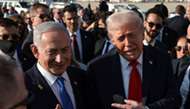Time Is Short as U.S. Pushes a Reluctant Pakistan

Soldiers standing guard on March 23 after a suicide bomber staged an attack on a police station in Islamabad.
By JANE PERLEZ
ISLAMABAD, Pakistan - President Obama’s strategy of offering Pakistan a partnership to defeat the insurgency here calls for a virtual remaking of Pakistan’s institutions and even of the national psyche, an ambitious agenda that Pakistan’s politicians and people appear unprepared to take up.
Officially, Pakistan’s government welcomed Mr. Obama’s strategy, with its hefty infusions of American money, hailing it as a“positive change.”But as the Obama administration tries to bring Pakistanis to its side, large parts of the public, the political class and the military have brushed off the plan, rebuffing the idea that the threat from Al Qaeda and the Taliban, which Washington calls a common enemy, is so urgent.
Some, including the army chief, General Ashfaq Parvez Kayani, and the president, Asif Ali Zardari, may be coming around. But for the military, India remains priority No. 1, as it has for the 61 years of Pakistan’s existence.
How to shift that focus in time for Pakistan to defeat a fast-expanding Islamic insurgency that threatens to devour the country is the challenge facing Admiral Mike Mullen, the chairman of the Joint Chiefs of Staff, and Richard C. Holbrooke, the special envoy to the region.
Strengthening Pakistan’s weak civilian institutions, updating political parties rooted in feudal loyalties and recasting a military fixated on yesterday’s enemy, and stuck in the traditions of conventional warfare, are generational challenges. But Pakistan may not have the luxury of the long term to meet them.
Some analysts are already putting forward apocalyptic timetables. “We are running out of time to help Pakistan change its present course toward increasing economic and political instability, and even ultimate failure,”said a recent report by a task force of the Atlantic Council that was led by former Senator Chuck Hagel of Nebraska and Senator John Kerry of Massachusetts. The report, released in February, gave the Pakistani government 6 to 12 months before things went from bad to dangerous.
A specialist in guerrilla warfare, David Kilcullen, who advised General David H. Petraeus when General Petraeus was the American commander in Iraq, offered a more dire assessment. Pakistan could be facing internal collapse within six months, he said. General Petraeus, in recent Congressional testimony, called the insurgency one that could“take down”the country, which is home to Qaeda militants and has nuclear arms.
Even before the insurgency has been fully engaged, however, many Pakistanis have concluded that reaching an accommodation with the militants is preferable to fighting them. Some, including mid-ranking soldiers, choose to see the militants not as the enemy, but as fellow Muslims who are deserving of greater sympathy than are the American aims.
It is problematic whether the backing of Mr. Zardari, and the Obama administration’s promise of $1.5 billion in aid for each of the next five years, can change the mood in the country, said a former interior minister, Aftab Ahmad Sherpao, who met officials now in the Obama administration in Washington last fall.
Fighting the insurgency is commonly seen in Pakistan as an American cause, not a Pakistani one, he said.
There are questions, too, of whether the Obama offer of nearly $3 billion in counterinsurgency aid can quickly convert the Pakistani military from a force trained to fight India on the plains of Punjab into an outfit that can conquer the mountains of the tribal areas, where the militants operate.
“After such a long time of being with the Americans, the country has been through such stress and strain and nothing good has come of it,”Mr. Sherpao said.“A cross-section of people is dead set against the Americans. Another section is not happy but not vocal. About 1 to 2 percent would say this policy of America should continue.”
The distrust has been heightened by charges from American officials, including General Petraeus and Mr. Holbrooke, that Pakistan’s spy agency is still supporting the Islamic militants who pour over the border to fight American troops in Afghanistan. A former director general of the agency Inter-Services Intelligence, Lieutenant General Javed Ashraf, said the American opinions did not augur well. A spokesman for the Pakistani military called them“baseless”and part of a“malicious campaign.”
“You can’t start a successful operation with a trust deficit,”General Ashraf said.“Pakistan is an ally. But then you say we are linked with the Taliban. The serving army people will say,‘To hell with them if this is what we are going to get after laying down more than 1,500 lives.’
That is the number of soldiers the Pakistani Army says have been killed fighting the militants in the tribal areas.
Then there is India. Its growing presence in Afghanistan makes Pakistan believe it is being encircled, said Ishaq Khan Khakwani, a former senator from the Pakistan Muslim League-Q party.
Pakistanis complain that even though Mr. Obama, during his European trip, called for dialogue between India and Pakistan, his plans fail to address this .
“The United States has to get India to back off in Afghanistan,”said Mr. Khakwani, who is sympathetic to the American position.“Then Pakistan will see Indian interference is diminished and that will give confidence to Pakistan.”
스마터리빙
more [ 건강]
[ 건강]이제 혈관 건강도 챙기자!
[현대해운]우리 눈에 보이지 않기 때문에 혈관 건강을 챙기는 것은 결코 쉽지 않은데요. 여러분은 혈관 건강을 유지하기 위해 어떤 노력을 하시나요?
 [ 건강]
[ 건강]내 몸이 건강해지는 과일궁합
 [ 라이프]
[ 라이프]벌레야 물럿거라! 천연 해충제 만들기
 [ 건강]
[ 건강]혈압 낮추는데 좋은 식품
[현대해운]혈관 건강은 주로 노화가 진행되면서 지켜야 할 문제라고 인식되어 왔습니다. 최근 생활 패턴과 식생활의 변화로 혈관의 노화 진행이 빨라지고
사람·사람들
more
“취미생활로 다진 친목… 선후배들과 만든 모교사랑”
사진러브한인 사진 동호회 사진러브(회장 크리스 고)는 13일 용수산에서 송년모임을 갖고 한 해를 마무리하는 뜻깊은 시간을 가졌다. 이날 모임에…

[홀인원] 이상원 박사
일반외과 전문의 이상원(왼쪽) 박사가 지난 9일 뉴포트비치 소재 골프장 9번 홀(152야드)에서 레스큐 클럽으로 친 샷이 그대로 홀에 빨려 들…
[송년행사 게시판] 재미시인협회
재미시인협회(회장 지성심)는 오는 20일 오후 4시 가든스윗호텔에서 한 해를 마무리하며 동인지 ‘외지’ 제35집 출판 기념회와 ‘제23회 재미…
[송년행사 게시판] 향군단체 연합
6.25 참전유공자회와 대한민국 육군협회 등 남가주 지역 향군 단체 연합은 19일 오전 11시30분, 용궁에서 송년 행사를 개최한다. 드레스코…
[송년행사 화보] “이웃과 함께 나누고 지인과 함…
KYCC13일 윌튼 플레이스 초등학교에서 열린 ‘한인타운청소년회관(KYCC) 홀리데이 카니발’이 성황리에 막을 내렸다. 올해는 KYCC 창립 …
많이 본 기사
- ‘손예진♥’ 현빈, 학부모 모드ON.. “아들이 배우 한다면? 하..” 한숨
- [건강포커스] “밤에 더 자주 깨는 어르신, 다음 날 인지수행 능력 떨어져”
- 젤렌스키 “우크라 선거 방식, 푸틴이 결정할 문제 아냐”
- 요르단 “美 시리아 IS 공습에 참여…안보 위협 저지”
- ‘새댁’ 함은정, 결혼식 하자마자..내조의 여왕
- 尹 김건희특검 첫 조사 8시간 반 만에 종료…6개 혐의 모두 부인
- 쿠팡 주주, 美법원에 집단소송… “정… 1
- 트럼프, ‘바이든 임명’ 직업 외교관 출신 대사들 대거 소환
- 與 “내란 2차 종합 특검해야”…국힘 “통일교 특검이 국민 명령”
- 안세영, ‘천적’ 야마구치도 넘었다…역대 최다승까지 단 한 걸음
- ‘이젠 SD 송성문’ 3루엔 ‘3억 5000만 달러’ 마차도 버티는데... 단장이 답했다 “다양한 역할 소화할 것”
- 교황, 전세계 추기경 바티칸 소집…내달 7∼8일 첫 회의
- 개명 하루만에 케네디센터 외벽에 ‘트… 1
- ‘유세방불’ 트럼프 “관세가 물가 올… 1
- 신민아♥김우빈, 결혼식 날 웨딩 사진 첫 공개..눈부신 투샷
- “네타냐후, 트럼프 만나 ‘이란 추가 타격’ 설명 계획”
- ‘80세’ 선우용여, 대세 유튜브 수… 1
- “박나래, 주사 이모 약에 내성 생겨..약 떨어지면 연락하라고”
- 이 대통령 “피도 눈물도 없는 금융사… 1
- 동업자에서 채무자로..MC몽, 차가원… 1
- “개인 부동산 취득, 법카 사적 유용” 박수홍 친형 구속 이유 보니
- 故윤석화 빈소에 추모 발길… “하늘에서 좋은 작품 많이 하기를”
- 시민권 박탈 착수⋯매달 200명 1
- 대북제재 완화 시그널… 이 대통령, … 1
- “AI 보안으로 클라우드 시장 잡자”…구글, 100억 달러 보안 파트너십
- 위기의 트럼프 “내년봄 최대규모 세금환급”
- “루비랑 데이트”..송혜교의 따뜻한 연말
- ‘김혜성도 넘었다’ 6년 120억 결… 1
- ‘테슬라 2018년 머스크 보상안’ 법원서 부활…1천400억달러 규모
- 뉴욕주 차량운전자 벌점 규정 대폭 강화
- 구글, 검색결과 크롤링 업체 상대 소송…AI 경쟁사 견제 의도
- 법무부, ‘엡스타인문건’ 공개…정재계 추가 연루 증거 나올까
- 퀸즈장로교회 ‘사랑의 바구니’130개 이웃에 전달
- [업계] 12월 내내 크리스마스 특별 메뉴 출시
- 해군, 트럼프 ‘황금함대’ 새 전함 … 1
- 명문대 조기전형 합격률 속속 발표
- 금리 인상 ‘엔 캐리(싼 이자로 엔화 빌려 투자)’ 빠져나갈라… 비트코인·환율 ‘출렁’
- 30년 만에 ‘금리 0.5%’ 허문 일본
- 뉴욕-뉴저지 다리· 터널 통행료 또 오른다
- 아마존, 칩 조직 통합 개발사 본격 변신 포석
- 尹 소환한 김건희특검, ‘명태균 의혹’부터 6가지 혐의 순차 추궁
- 이 대통령, “불법촬영물, 초국가 범… 1
- 브라운대 총격 용의자 시신 발견… ‘… 1
- 파워볼 1등 잭팟 15억 달러로 치솟아
- 고환율, 생산자 물가 석달째 오름세
- 북한군, 지난달 MDL 10번 넘었다
- “불공정 행위 걸리면 망하게 대기업 과징금 세게 때려야”
- 트럼프, 화성은 미루고 달부터…머스크… 2
- [새해부터 이렇게 달라진다] 최저임금 또 오르고… 유급 병가는 더 확대
- 美, 동태평양서 또 마약운반선 2척 공격…5명 사망
1/5지식톡

-
 ☝️해외에서도 가능한 한국어 선생님…
0
☝️해외에서도 가능한 한국어 선생님…
0이 영상 하나면 충분합니다!♥️상담신청문의♥️☝️ 문의 폭주로 '선착순 상담'만 진행합니다.☎️ : 02-6213-9094✨카카오톡ID : @GOODEDU77 (@골뱅이 꼭 붙여주셔야합니다…
-
 테슬라 자동차 시트커버 장착
0
테슬라 자동차 시트커버 장착
0테슬라 시트커버, 사놓고 아직 못 씌우셨죠?장착이 생각보다 쉽지 않습니다.20년 경력 전문가에게 맡기세요 — 깔끔하고 딱 맞게 장착해드립니다!장착비용:앞좌석: $40뒷좌석: $60앞·뒷좌석 …
-
 식당용 부탄가스
0
식당용 부탄가스
0식당용 부탄가스 홀세일 합니다 로스앤젤레스 다운타운 픽업 가능 안녕 하세요?강아지 & 고양이 모든 애완동물 / 반려동물 식품 & 모든 애완동물/반려동물 관련 제품들 전문적으로 홀세일/취급하는 회사 입니다 100% …
-
 ACSL 국제 컴퓨터 과학 대회, …
0
ACSL 국제 컴퓨터 과학 대회, …
0웹사이트 : www.eduspot.co.kr 카카오톡 상담하기 : https://pf.kakao.com/_BEQWxb블로그 : https://blog.naver.com/eduspotmain안녕하세요, 에듀스팟입니다…
-
 바디프렌드 안마의자 창고 리퍼브 세…
0
바디프렌드 안마의자 창고 리퍼브 세…
0거의 새제품급 리퍼브 안마의자 대방출 한다고 합니다!8월 23일(토)…24일(일) 단 이틀!특가 판매가Famille: $500 ~ $1,000Falcon: $1,500 ~ $2,500픽업 & 배송직접 픽업 가능LA…
케이타운 1번가
오피니언
 한영일 / 서울경제 논설위원
한영일 / 서울경제 논설위원[만화경] 웰다잉 인센티브
 캐슬린 파커 워싱턴포스트 칼럼니스트
캐슬린 파커 워싱턴포스트 칼럼니스트 [캐슬린 파커 칼럼] 아이들을 온라인에서 보호하기
 양상훈 수필가ㆍ시인
양상훈 수필가ㆍ시인 [한국춘추] 경제대공황ㆍ제2차 세계대전 승리로 극복한 루스벨트 리더쉽

[왈가 왈부] 고환율에 외환 건전성 완화·서학개미 규제… 미봉책 아닌가요
 수잔 최 한미가정상담소 이사장 가정법 전문 변호사
수잔 최 한미가정상담소 이사장 가정법 전문 변호사 [수잔 최 변호사의 LIFE &] AI 시대 편리함에 안주하지 말자
 김도년 성균관대 건축학과 교수 스마트도시·건축학회장
김도년 성균관대 건축학과 교수 스마트도시·건축학회장 [로터리] 지멘스가 만드는 미래 동네
1/3지사별 뉴스

퀸즈장로교회 ‘사랑의 바구니’130개 이웃에 전달
퀸즈장로교회가 18일 크리스마스를 앞두고 교인들의 정성과 사랑이 듬뿍 담긴 ‘사랑의 바구니’ 130개를 소방서와 경찰서, 요양원, 선교회, 그…
시민권 박탈 착수⋯매달 200명

“이웃 돌보는 여러분이 동역자”
워싱턴성광교회(담임목사 임용우)는 18일 한인단체와 소방서‧도서관 등에 총 2만9천 달러의 성금을 전달했다. 지난 2011년부터 15년째 지역…
소기업 지원에 1천만 달러 투자

위기의 트럼프 “내년봄 최대규모 세금환급”
트럼프 대통령은 17일 “취임 1년 만에 우리는 누구도 상상하지 못한 성과를 이뤄냈다”고 말했다.트럼프 대통령은 동부시간 이날 밤 9시부터 백…
[새해부터 이렇게 달라진다] 최저임금 또 오르고… 유급 병가는 더 확대

오늘 하루 이 창 열지 않음 닫기 




















































.png)


댓글 안에 당신의 성숙함도 담아 주세요.
'오늘의 한마디'는 기사에 대하여 자신의 생각을 말하고 남의 생각을 들으며 서로 다양한 의견을 나누는 공간입니다. 그러나 간혹 불건전한 내용을 올리시는 분들이 계셔서 건전한 인터넷문화 정착을 위해 아래와 같은 운영원칙을 적용합니다.
자체 모니터링을 통해 아래에 해당하는 내용이 포함된 댓글이 발견되면 예고없이 삭제 조치를 하겠습니다.
불건전한 댓글을 올리거나, 이름에 비속어 및 상대방의 불쾌감을 주는 단어를 사용, 유명인 또는 특정 일반인을 사칭하는 경우 이용에 대한 차단 제재를 받을 수 있습니다. 차단될 경우, 일주일간 댓글을 달수 없게 됩니다.
명예훼손, 개인정보 유출, 욕설 등 법률에 위반되는 댓글은 관계 법령에 의거 민형사상 처벌을 받을 수 있으니 이용에 주의를 부탁드립니다.
Close
x